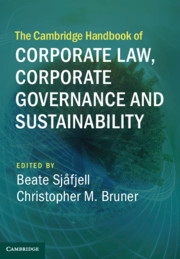Book contents
- Reviews
- The Cambridge Handbook of Corporate Law, Corporate Governance and Sustainability
- The Cambridge Handbook of Corporate Law, Corporate Governance and Sustainability
- Copyright page
- Dedication
- Contents
- Contributors
- Forewords
- Preface
- Introduction
- Part I Global Business and Fragmented Regulation
- Part II Corporate Law, Financial Markets and Sustainability
- Part III Corporate Law, Corporate Governance and Sustainability: Case Studies
- 10 Progress Is Possible
- 11 Green but Not Enough
- 12 The Australian Paradox
- 13 Moving beyond Virtue Signalling
- 14 The EU as a Potential Norm Creator for Sustainable Corporate Groups
- 15 Market-Led Sustainability through Information Disclosure
- 16 Law, Culture and Sustainability
- 17 Stakeholder Value versus Corporate Sustainability
- 18 Worker Participation, Sustainability and the Puzzle of the Volkswagen Emissions Scandal
- 19 Corporate Sustainability and Shareholder Activism in the Netherlands
- 20 Old-Fashioned yet Innovative
- 21 The Unsuccessful Pursuit for Sustainability in Italian Business Law
- 22 Sustainability and the Transformation of the Socialist Corporation into the Private Corporation
- 23 Limited Demand, Limited Supply
- 24 The Pacific Alliance
- 25 Social Environmentalism and Corporate Capture
- 26 The Social and Ethics Committee
- 27 Reforming the Nigerian Oil and Gas Sector
- 28 Enlightenment or Resistance?
- 29 The Community Company as a Vehicle for Sustainability in Solomon Islands
- 30 What Does It Mean to Be Sustainable?
- 31 Shareholder Voting and Corporate Sustainability in China
- 32 Corporate Governance Reform, Social Norms and Sustainability in Japanese Companies
- 33 Achieving Sustainable Development Goals in India
- 34 Sustainability and Legislated Corporate Social Responsibility in Indonesia
- 35 Islamic Financial Institutions and Corporate Sustainability
- 36 Leaders or Laggards?
- Part IV Potential Drivers for Change
- Conclusion
- Index
28 - Enlightenment or Resistance?
Promoting Sustainability through Corporate Law and Governance in Mauritius
from Part III - Corporate Law, Corporate Governance and Sustainability: Case Studies
Published online by Cambridge University Press: 25 November 2019
- Reviews
- The Cambridge Handbook of Corporate Law, Corporate Governance and Sustainability
- The Cambridge Handbook of Corporate Law, Corporate Governance and Sustainability
- Copyright page
- Dedication
- Contents
- Contributors
- Forewords
- Preface
- Introduction
- Part I Global Business and Fragmented Regulation
- Part II Corporate Law, Financial Markets and Sustainability
- Part III Corporate Law, Corporate Governance and Sustainability: Case Studies
- 10 Progress Is Possible
- 11 Green but Not Enough
- 12 The Australian Paradox
- 13 Moving beyond Virtue Signalling
- 14 The EU as a Potential Norm Creator for Sustainable Corporate Groups
- 15 Market-Led Sustainability through Information Disclosure
- 16 Law, Culture and Sustainability
- 17 Stakeholder Value versus Corporate Sustainability
- 18 Worker Participation, Sustainability and the Puzzle of the Volkswagen Emissions Scandal
- 19 Corporate Sustainability and Shareholder Activism in the Netherlands
- 20 Old-Fashioned yet Innovative
- 21 The Unsuccessful Pursuit for Sustainability in Italian Business Law
- 22 Sustainability and the Transformation of the Socialist Corporation into the Private Corporation
- 23 Limited Demand, Limited Supply
- 24 The Pacific Alliance
- 25 Social Environmentalism and Corporate Capture
- 26 The Social and Ethics Committee
- 27 Reforming the Nigerian Oil and Gas Sector
- 28 Enlightenment or Resistance?
- 29 The Community Company as a Vehicle for Sustainability in Solomon Islands
- 30 What Does It Mean to Be Sustainable?
- 31 Shareholder Voting and Corporate Sustainability in China
- 32 Corporate Governance Reform, Social Norms and Sustainability in Japanese Companies
- 33 Achieving Sustainable Development Goals in India
- 34 Sustainability and Legislated Corporate Social Responsibility in Indonesia
- 35 Islamic Financial Institutions and Corporate Sustainability
- 36 Leaders or Laggards?
- Part IV Potential Drivers for Change
- Conclusion
- Index
Summary
Despite various international initiatives and soft/hard law reforms over the last two decades, concerns abound as the extent to which the sustainability agenda has become embedded in emerging economies. This chapter focuses on Mauritius, specifically the emergence of a sustainability discourse as part of corporate governance reforms, the enactment of a national sustainable development agenda, and the implementation of the first corporate social responsibility legislation in the world, requiring companies to finance related projects. Our empirical analysis, primarily focused on corporate settings, and informed by the country’s socio-economic and political contexts, reveals wide variation in corporate engagement and the advent of a form of state control over the execution of projects. Overall, our implications seek to identify lessons for other emerging economies, particularly in terms of state-level attempts to mandate corporate social responsibility.
- Type
- Chapter
- Information
- Publisher: Cambridge University PressPrint publication year: 2019

